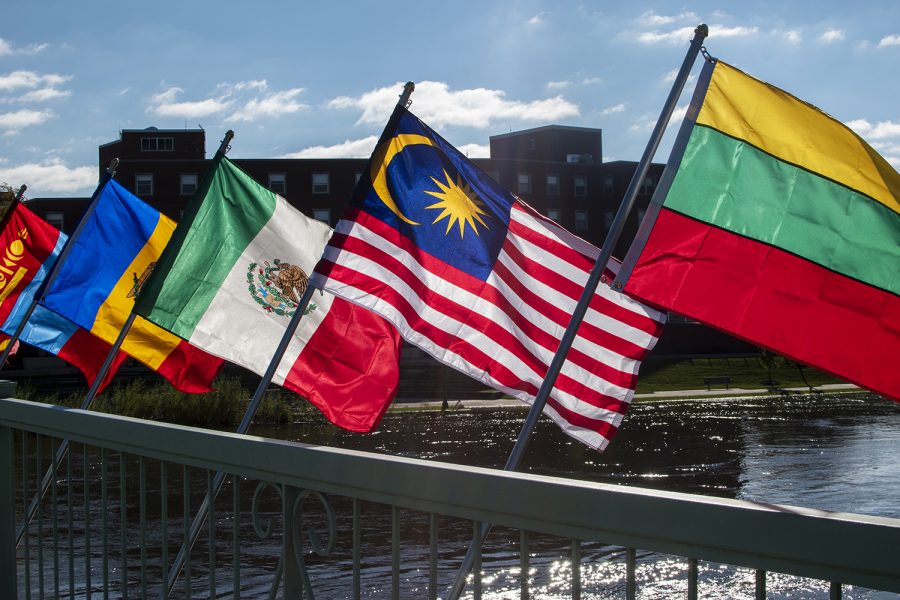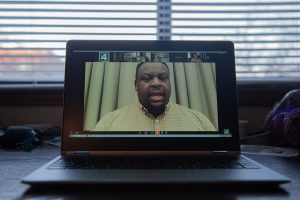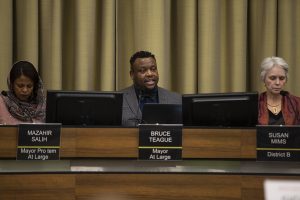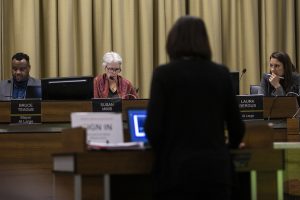UI international students may need to leave U.S. after Thanksgiving per new ICE order
The UI plans to implement a hybrid model for teaching courses in the fall, but international students may be required to leave the U.S. after the university switches to an all-online format following Thanksgiving break.
Over 100 flags are on display on the Iowa Memorial Union Pedestrian Bridge to recognize the international students on campus.
July 8, 2020
International students studying at the University of Iowa may need to leave the United States by Thanksgiving break or earlier after the Student and Exchange Visitor Program’s Monday announcement that new modifications to temporary exemptions for nonimmigrant students taking online classes would take effect.
The exemptions issued by the program, which is part of the U.S. Immigration and Customs Enforcement, ask international students who are enrolled in all-online courses at their school due to the coronavirus pandemic to leave the U.S. by the fall semester or transfer to a school that will offer in-person instruction. Students who do not comply risk legal consequences, including deportation.
The UI currently anticipates implementing a hybrid model for classes this fall. Classes with over 50 students enrolled will be taught online, and the university will switch to an entirely online format following Thanksgiving break.
According to a FAQ sheet provided by UI International Student and Scholar Services, students will be required to take at least one course in person in order to keep their SEVIS record active.
“Once the University of Iowa moves exclusively to online classes after Thanksgiving break, it may be necessary for international students to leave the United States. We are seeking further guidance on this point,” the FAQ sheet states.
The implications for UI international students is still unclear, and UI officials said they are working with other agencies to determine the next steps for the university’s international student community.
“The university is currently working with its sister Regents institutions, national higher education associations, and the Iowa delegations to address the devastating impacts this decision will have on its international students,” UI media-relations Director Anne Bassett said in an email to The Daily Iowan.
As of fall 2019, international students made up 5 percent of the UI’s undergraduate student enrollment. 2,225 international students were enrolled at the UI under F-1 status, Bassett said.
UI international programs administrators said they will try to support students affected by the policy and will continue communicating with them as more information develops.
“The UI is an inclusive institution that welcomes members of the international community and values their numerous contributions to our university,” said Dean of International Programs Russ Ganim. “International Programs is here to lend all the support it can to our international students in this time of distress, and we urge international students to contact us immediately should the need arise.
The UI is the only one of Iowa’s three regent universities to go completely online after Thanksgiving. Iowa State University and the University of Northern Iowa opted to start classes a week earlier and end the semester after Thanksgiving.
For Mishma Nixon, a UI international student from Sri Lanka, the potential for future travel bans mean possibly not being able to return to her country by Thanksgiving once she comes back to the U.S. in August for her junior year.
“Sri Lanka’s borders have been closed since March 17 and they’re still closed. I was only able to come back home through a special repatriation flight and I’ve been on the waitlist for this flight since [the first week of] May,” Nixon said. “We have no idea when Sri Lanka will reopen, so the problem would be if it’s either still not open or if the second wave hits and they close the borders again, I don’t know if I would be able to do all of this again and come back home in November.”
Some UI professors are exploring ways to provide options for international students to take courses in-person to avoid the need for them to be sent home earlier than Thanksgiving. While unsure yet of how to effectively implement the idea, co-instructors Andrew Forbes and Maurine Neiman have already reassured members of their Ecology class — an upper-level course that is planned to be taught entirely online this fall — that they will work to find a way to safely teach international students in person.
“This was a way of providing reassurance to the students that we care. That we’re aware of the issues,” Neiman said. “We do think that we have to exercise some patience; the university is a big place with a lot of bureaucracy. We know that a lot of the administrators and faculty and staff care about the students too and I think a lot of them are very concerned about this issue and want to help make it better. The university can’t turn on a dime.”
Nixon said that while public outrage and confusion is prominent among many students, she isn’t sure what the best solution would be for the University of Iowa to effectively aid its entire international student population.
“I don’t have a solution for them, because the problem here is that what’s going to affect me maybe in a good way is going to affect someone else in a bad way,” she said. “We’re not all in the same boat right now.”
Nixon also said that among international students’ broader concerns, it’s the smaller things about studying in a different country that could make the largest impact.
“It’s not just going to be classes for us that we’re missing out on. Because of course I’m like half a day ahead [of Iowa] and I would be waking up in the middle of the night to take classes if I do stay home, but that’s not it,” she said. “We have student organizations, being very involved in school, there’s research that people are involved in, I have a job. There’s our friendships, our relationships… In a situation like this, people first think about academics and your legal status and all that, but also there’s the human aspect of it — just like standing to lose everything you’ve built for how many years you’ve been outside of your country.”







